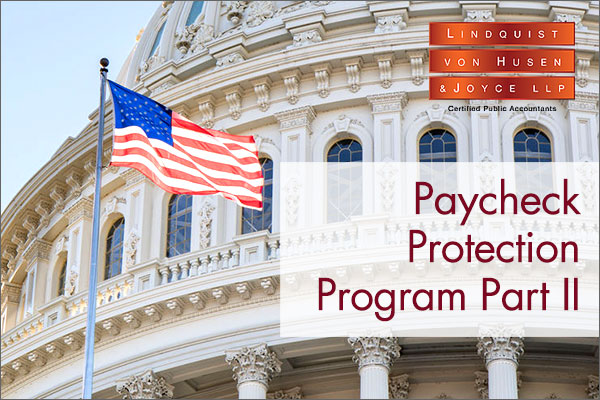
The Senate passed a bill of nearly $480 billion on Tuesday afternoon to extend funding for the Paycheck Protection Program (PPP), provide additional funding for hospitals, and expand funding for COVID-19 testing. Some $310 billion is earmarked for the PPP, which last week had exhausted all of the program’s initial $349 billion funding in less than two weeks due to overwhelming demand. The bill now goes to the House, which is expected to vote on and approve the package on Thursday.
PPP was established by the Coronavirus Aid, Relief and Economic Security (CARES) Act to provide emergency small business loans to entities affected by COVID-19. The program is administered by the Small Business Administration (SBA) and is designed to provide a direct incentive for small businesses to keep their employees on the payroll. Loans made to small businesses by lenders are backed by the SBA. Loans will be forgiven if the funds are used for payroll costs, interest on mortgages on real or personal property incurred before February 15, 2020, rent on lease agreements in force before February 15, 2020, and utilities under service agreements dated before February 15, 2020 (at least 75% of the forgiven amount must have been used for payroll costs) over the eight weeks after getting the loan. You will owe money when the loan is due if the loan is used for anything other than the permitted uses.
Loans can be for up to two months of your average monthly payroll costs from the last year plus an additional 25% of that amount. Payroll costs are capped at $100,000 annualized for each employee. Your loan forgiveness will be reduced if you decrease your full-time equivalent employee head count. Your loan forgiveness will also be reduced if you decrease salaries and wages by more than 25% for any employee that made less than $100,000 annualized in 2019. You have until June 30, 2020, to restore your full-time employment and salary levels for any changes made between February 15, 2020 and April 26, 2020.
- The following entities affected by COVID-19 can apply for the small business loan:
- Any small business concern that meets SBA’s size standards (either the industry-based size standard or the alternative size standard)
- Any business, 501(c)(3) non-profit organization, 501(c)(19) veterans organization, or Tribal business concern (sec. 31(b)(2)(C) of the Small Business Act) with no more than the greater of:
o 500 employees, or
o That meets the SBA industry size standard if more than 500 - Any business with a NAICS Code that begins with 72 (Accommodations and Food Services) that has more than one physical location and employs less than 500 per location
- Sole proprietors, independent contractors, and self-employed persons. General active partners in a partnership may also apply for a loan through their partnership, as their self-employment income may be reported as payroll (up to $100,000 annualized for each partner).
Loan payments are deferred for 6 months. The interest rate is 1%, and the loan has a maturity of 2 years. After an entity receives funding, an eight-week coverage period begins in which you will need to track use of PPP funds to support an application for up to 100% loan forgiveness. Further guidance is pending on this process.
If you are still interested in applying for a loan under the PPP, please contact your participating bank or credit union as soon as possible, as there is overwhelming interest and demand for loans under the program
If your organization receives funds from CARES Act relief options, it’s important to properly account for the expenses you allocate the money to within your nonprofit financial statements. Lindquist, von Husen & Joyce LLP has advised nonprofits and affordable housing organizations on accounting standards for decades. Request a consultation today!
You may also be interested in this blog post where we discuss how to account for forgivable loans like the ones available through the CARES Act.








